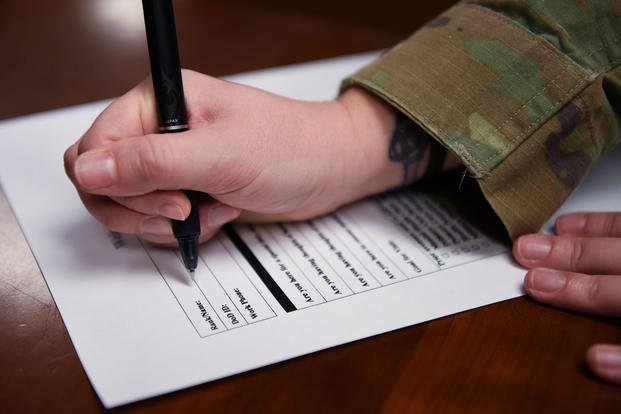Jennifer Barnhill is a columnist for Military.com writing about military families.
When I first moved to my husband's current duty station, a woman on the other end of the line at Tricare West's call center said that the local military treatment facility (MTF) was full and no longer taking new patients. I was given the name and phone number of a local physician and sent on my way.
After weeks of leaving messages with no reply, I finally got ahold of someone at the doctor's office.
"I'm sorry, I know that our website says we are accepting patients, but that is old information," the receptionist said.
I called Tricare and was assigned a new doctor, only to be rejected again as the office wasn't taking new Tricare patients. It happened a total of three times.
When I finally called Tricare West back after the third doctor rejected me, so much time had passed that a spot had opened up at the MTF. When I voiced my frustration at this runaround, I was told I needed to call yet another number to help update Tricare's provider list. This was the mental load I was handed because my husband had orders from the Navy to move to a new duty station.
I was lucky. My three kids were assigned to doctors right away, and no one in my family is medically complex. For those who have to line up specialty or mental health care, the back and forth can become a full-time job. But is the mental load of using military benefits to be expected or an indicator of a broken system?
"My son was enrolled in the CDC [military base child care], but due to his behavior issues and sensory issues, he was getting kicked out almost daily," said active-duty airman Master Sergeant Rachel Kegley. When she shared her concerns with her pediatrician, she was told that her son would grow out of it. When she took him to his kindergarten physical three years later, the provider put in a referral for a neuro-psych evaluation to hopefully provide the family with answers.
"We called all over town; no one had any openings," said Kegley. When she finally obtained an autism diagnosis for her son, Kegley turned to the Exceptional Family Member Program (EFMP) for resources and support. But after an initial phone call, she says she never heard from the care coordinator again. So, she kept making calls. "Most of them are not taking patients or they no longer take Tricare. Same thing with pharmacies. You call around trying to find a medication for your kids, and either they don't have the medication or they don't take Tricare. … It is very challenging."
The concept of the "mental load" or invisible work has gone viral in recent years, largely focusing on the small but nagging tasks that often go unacknowledged at home and at work and are disproportionately heaped on women -- making doctor's appointments, checking the kids' backpacks to ensure there isn't a crumpled permission slip hiding under a rotten banana, etc.
It means living with a never-ending to-do list. They are the little tasks that keep a family running, but can wear on the person who carries the bulk of the "load." When the already complex process of accessing benefits is combined with military bureaucracy, the mental burden can loom large.
"There's so many loopholes to jump through, and we spend so much time applying for these things," said Amanda Larimore, an Air Force spouse and parent of a child diagnosed with autism spectrum disorder.
Despite being eligible for supportive services, Larimore reports experiencing difficulty accessing services like respite care, a program that allows families to receive up to 20 hours a month of specialized care for physical and neurological disabilities. However, accessing this benefit can be difficult. Larimore reports that leadership has been working on strengthening the network, but until then, the only available providers are in a different state, hours away.
Larimore was told there is a shortage of providers, but found that there actually were providers, just none who participated in the respite care program.
Exceptional Family Member Program families, like the Larimores, may experience a more obvious mental load. They have to fill out more paperwork -- military and civilian -- and often are under the care of more than one doctor, requiring referrals and more chances to be on wait-lists. Families hope that they will be assigned to a base in an area that can provide for their needs, but this is not always the case.
"Families said that they've been to some locations that were EFMP-approved, but because there's so many EFMP families there, there's no service because the services are all taken up already," said Dr. Jennifer Kremkow, an associate professor at Elmhurst University. Kremkow has published numerous studies examining the experiences of military families whose children have autism.
"Something that a lot of the parents discussed was just the challenge of managing all of it, especially if their service member was otherwise occupied, if they were separated, or they were at a training," she said.
According to the Tricare for Kids Coalition (TFK), an organization that advocates for health care access for military kids, the Air Force has been sending many EFMP families to Colorado Springs, Colorado, as a designated EFMP location. However, in October 2023, the Defense Health Agency cut Tricare reimbursements by 40% for some outpatient services. The Children's Hospital Colorado in Colorado Springs subsequently filed a lawsuit against the Department of Defense because of this change. Although EFMP families in the area have not yet reported a disruption, according to TFK founder Kara Tollett Oakley, the coalition is concerned about disruptions in access to care when high demand and low reimbursement make it challenging for providers to serve military families.
But it is not just EFMP families who experience the mental load.
"The military subsidy has been nothing but a challenge and a headache," said Jennifer O'Donnell, owner and operator of Uptown Children's Academy who is also married to a retired Marine. Both Military Child Care in Your Neighborhood and Child Care in Your Home programs provide fee assistance to military families who cannot access military-operated child care, but are managed separately. "I've had some parents give up because after six, seven months of sending the same stuff in over and over and over again, they just get to a point where they're done."
Aria Spears, an Army spouse who was struggling to find child care so she could retain her job, knows that battle firsthand. "We were working to find infant [child care] for nine months and just couldn't find anything, but finally today … after I don't even know how many calls, how many times we called the same place over and over and over the past few months, somebody called me with this spot," Spears said. "But I quit my job two weeks ago because I thought that it was just impossible to find child care."
Finding affordable health and child care is a struggle for all Americans. However, studies show that military families report having a harder time because of how frequently they need to reestablish care. "We are now finding that, because these things exist out in the civilian sector, like shortages and specialists and wait times and frustration with how the system operates, that is being used to excuse the many barriers that are in place for military families," said Tollett Oakley.
"The issue is an erosion of the benefit that's happening behind the scenes," said Karen Ruedisueli, director of health affairs and government relations for the Military Officers Association of America. "If you're looking to manage health care costs within Tricare, you can reduce networks, you can reduce coverage policy, you can increase fees to people. Fee increases are very obvious to everybody."
If child care providers like O'Donnell or organizations like Children's Hospital Colorado feel as though the juice isn't worth the squeeze, they may choose not to sign up to be providers for military families. Because there are no cuts, there is no outcry to protect the benefit.
Families feel the mental load produced by the lack of providers and are reminded to "embrace the suck."
When the delays, waits and hold times are expected and untracked, they can easily be dismissed as anecdotes. But if this "mental load" were tracked, it could prove a useful indicator of the health and true accessibility of military benefits.













